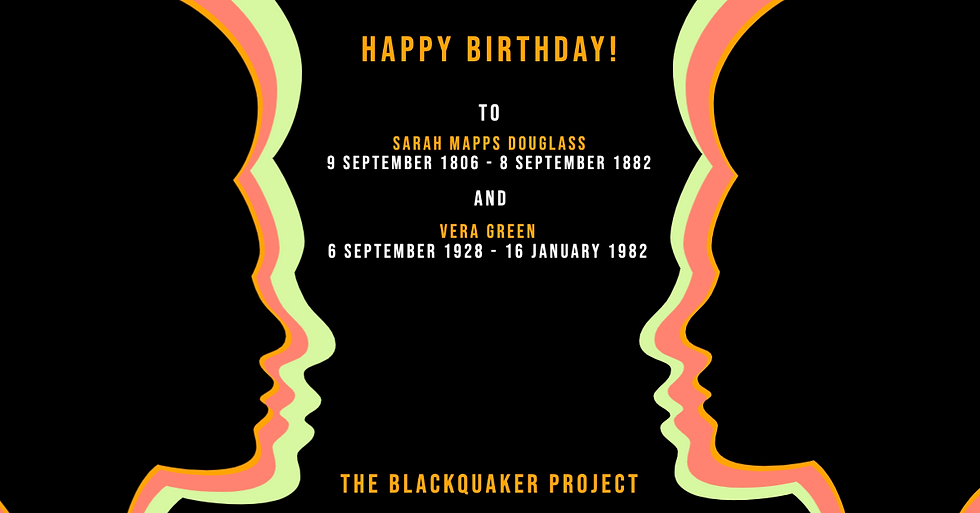Happy Birthday, Sarah Mapps Douglass (9 September 1806) and Vera Green (6 September 1928)!
- Timothy Vaughn

- Sep 6, 2020
- 2 min read
Trailblazing African American Women Quaker Scholar-Activists.

This week the BlackQuaker Project celebrates the lives of two highly accomplished African American Quakers, Sarah Mapps Douglass (9 September 1806 - 8 September 1882) and Vera Green (6 September 1928 - 16 January 1982). Sarah Mapps Douglass was born to a free African American Quaker family in Philadelphia and was an ancestor of Paul Robeson. Enduring lifelong racial prejudice, she was forced to sit in segregated seating on the back bench in Arch Street Meeting during worship. A fierce abolitionist, she confronted racism wherever she encountered it, even within the Society of Friends. She was also a renowned educator, as well as a prolific author with works featured in numerous anti-slavery journals. 1
Vera Green was an anthropologist at Rutgers University and, earlier, an active member of the 57th Street Meeting in Chicago, Illinois. Her study, “Blacks and Quakers: A Preliminary Report,” shed light on the relatively unexplored relations between African Americans and the Religious Society of Friends. Through interviews, she found that African Americans were attracted to the Society due to the relaxed, welcoming, and unceremonious nature of worship; the casual dress of its members; and the more understanding view of humanity Quakers held. Conversely, her study revealed that some African Americans were turned off by Quakers due to a perception of their values of patience and non-violence as being too passive and submissive at a time when radical, anti-racist action was required to confront white supremacy. Furthermore, Green found that the predominantly White composition of the Religious Society of Friends was another reason for African Americans to potentially reject Quakerism in favor of seeking Black spaces of worship for self expression and empowerment. Green concluded that clarification of the Peace Testimony was needed to emphasize non-violent forms of resistance as being different from simply being non-violent. 2
Though separated by many decades, both women lived careers as dedicated Quaker scholar-activists whom we remember for their commitment to justice, anti-racism, and liberation. To learn more about Sarah Mapps Douglass and Vera Green and read their selected works, please see Black Fire: African American Quakers on Spirituality and Human Rights, edited by Harold D. Weaver, Jr., Paul Kriese, and Stephen W. Angell (Philadelphia: Quaker Press of Friends General Council, 2011).
Notes
Stephen W. Angell, “Sarah Mapps Douglass (1806-1882),” in Harold D. Weaver, Jr., Paul Kriese, and Stephen W. Angell, eds., Black Fire: African American Quakers on Spirituality and Human Rights (Philadelphia: Quaker Press of Friends General Conference, 2011), 27-30.
Paul Kriese, “Vera Green (1928-1982),” in Harold D. Weaver, Jr., Paul Kriese, and Stephen W. Angell, eds., Black Fire: African American Quakers on Spirituality and Human Rights (Philadelphia: Quaker Press of Friends General Conference, 2011), 233-240.



Comments